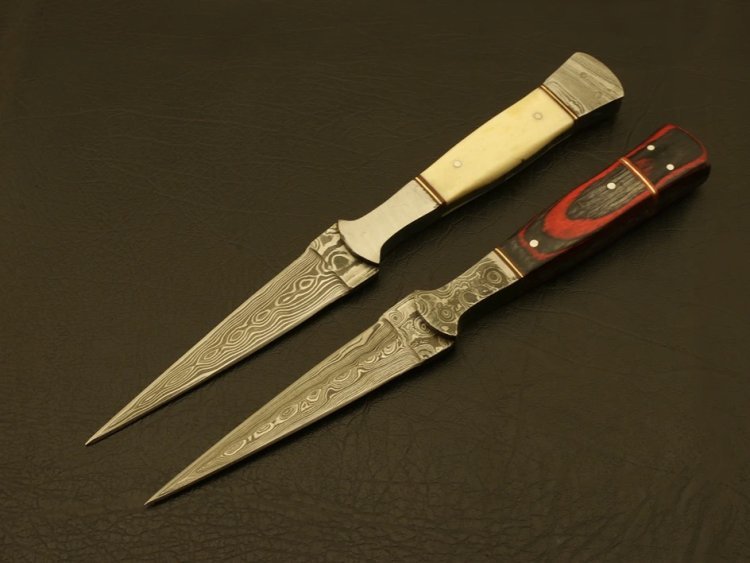The Ultimate Guide to Knives: Types, Uses, and Care
Knives are an indispensable tool that plays a vital role in our daily lives. From preparing meals to outdoor adventures, they serve countless purposes.

Knives are an indispensable tool that plays a vital role in our daily lives. From preparing meals to outdoor adventures, they serve countless purposes. But have you ever thought about their history or the craftsmanship behind them? Let’s dive into the fascinating world of knives and learn everything there is to know.
Types of Knives
Kitchen Knifes
A well-equipped kitchen is incomplete without the right set of knifes.
- Chef's Knife: The all-rounder, ideal for chopping, slicing, and dicing.
- Paring Knife: Perfect for intricate tasks like peeling or coring.
- Bread Knife: Its serrated edge makes slicing through crusty bread a breeze.
Hunting Knives
For outdoor enthusiasts, hunting knives are essential.
- Fixed Blade vs. Folding Blade: Fixed blades are robust, while folding knives are portable.
- Gut Hook Knives: Specifically designed for field dressing.
Utility and Pocket Knives
Everyday carry knives are versatile and compact.
- Swiss Army Knife: A multi-functional classic.
- Multi-Tools: Include pliers, screwdrivers, and more.
Specialty Knives
Some knives are tailored for unique purposes.
- Filleting Knife: Designed for delicate fish filleting.
- Cleaver: Ideal for heavy-duty chopping.
- Machete: A versatile tool for outdoor use.
Materials Used in Knives
Blade Materials
The blade’s material significantly impacts its performance.
- Stainless Steel: Resistant to rust and stains.
- Carbon Steel: Known for its sharp edge retention.
- Ceramic Blades: Lightweight and ultra-sharp but fragile.
Handle Materials
The handle ensures comfort and grip.
- Wood: Traditional and aesthetic but requires maintenance.
- Plastic: Lightweight and durable.
- Metal: Sleek and sturdy but can be heavy.
Choosing the Right Knife
When selecting a knife, consider its intended use. Are you chopping vegetables or going on a hunting trip? Quality, comfort, and budget also play a crucial role. A good knife feels like an extension of your hand.
Proper Knife Care
Cleaning Tips
Always clean knives immediately after use to prevent staining. Handwashing is recommended for most knives, as dishwashers can cause damage.
Sharpening Techniques
Regular sharpening is essential to maintain efficiency. Use a whetstone for precision, or opt for an electric sharpener for convenience.
Storage Solutions
Store knives safely to preserve their sharpness and prevent accidents. Knife blocks, magnetic strips, and blade guards are excellent options.
Safety Tips When Using Knives
Always cut away from your body and keep your fingers out of the blade’s path. Teach kids proper knife safety to avoid injuries.
The Art of Sharpening a Knife
A sharp knife not only works better but is also safer. Test sharpness by slicing a sheet of paper. If you’re unsure, professional sharpening services can help.
Knives in Different Cultures
Knives hold cultural significance worldwide. Japanese knives, for instance, are celebrated for their craftsmanship, while Western knives emphasize versatility.
Common Myths About Knives
Let’s debunk a few myths:
- A sharp knife is actually safer because it requires less force.
- Not all stainless steel is created equal—quality matters.
- Ceramic knives do need occasional sharpening.
Environmental Impact of Knife Production
Many companies are now focusing on sustainable materials and recycling options. You can even repurpose old knives creatively.
Future Innovations in Knives
The knife industry is evolving with smart knives and improved materials for enhanced performance and durability.
Conclusion
Knives are more than just tools—they’re a blend of art and science. Whether you’re a chef, camper, or collector, understanding knives helps you appreciate their value and utility.
FAQs
-
How do I know when to sharpen my knife?
If it struggles to cut through paper or food cleanly, it’s time to sharpen it. -
What’s the best knife for beginners in cooking?
A chef’s knife is versatile and great for most kitchen tasks. -
Are ceramic knives better than steel ones?
Ceramic knives are sharp and lightweight but less durable than steel. -
Can I bring a knife on a camping trip?
Yes, but ensure it complies with local regulations. -
How do I safely dispose of an old knife?
Wrap it securely and check local recycling guidelines for proper disposal.
What's Your Reaction?















